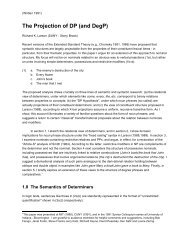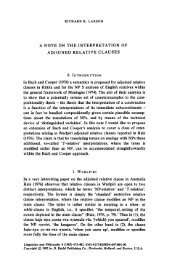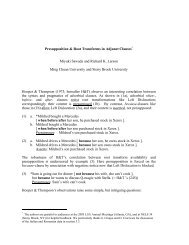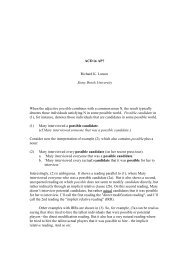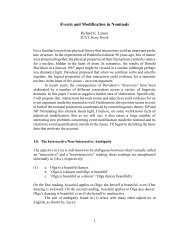Intensional Transitive Verbs and Abstract Clausal Complementation
Intensional Transitive Verbs and Abstract Clausal Complementation
Intensional Transitive Verbs and Abstract Clausal Complementation
You also want an ePaper? Increase the reach of your titles
YUMPU automatically turns print PDFs into web optimized ePapers that Google loves.
<strong>Intensional</strong> <strong>Transitive</strong> <strong>Verbs</strong> <strong>and</strong> <strong>Abstract</strong> <strong>Clausal</strong> <strong>Complementation</strong><br />
In fact we believe that the possibility of truth in comparatives containing non-denoting terms arises<br />
from a very different source than in intensional transitives like those discussed above. To make clear the<br />
difference, let us consider a simple "Twin Earth" style thought experiment involving Max <strong>and</strong> twin-Max.<br />
Max <strong>and</strong> twin-Max, although non-identical, are assumed to be alike in all relevant respects; they are<br />
physically identical down to the finest details of atomic composition; they have counterpart personal<br />
histories; they live their lives in identical circumstances in their respective worlds. If Max is the son of<br />
Minnie on Earth, then twin-Max is the son of twin-Minnie on Twin Earth, etc. With this background in mind,<br />
consider the three pairs in (104):<br />
(104) a. Seymour pinched/saw/greeted Max<br />
Seymour pinched/saw/greeted twin-Max<br />
b. Seymour needs/seeks/imagines Max<br />
Seymour needs/seeks/imagines twin-Max<br />
c. Seymour resembles/is similar to/ is smarter than Max<br />
Seymour resembles/is similar to/ is smarter than twin-Max<br />
Substitution of twin-Max for Max plainly fails to preserve truth in normal transitives: obviously Seymour<br />
can pinch Max without thereby pinching his Twin-Earth counterpart. Likewise, substitution of twin-Max for<br />
Max clearly fails to preserve truth in intensional transitives: Seymour can surely seek Max without thereby<br />
seeking his Twin-Earth counterpart (indeed, Seymour may have no idea that Max even has a<br />
dopplegänger). However, substitution of twin-Max for Max does preserve truth in comparative<br />
constructions. By assumption, Max <strong>and</strong> twin-Max are identical in all non-relational properties. Accordingly,<br />
if Seymour resembles/is similar to Max, he will resemble/ be similar to twin-Max. Likewise, for any<br />
adjective A (tall, deceptive, h<strong>and</strong>some, poor, etc.), the following with be true:<br />
(105) a. Seymour is as A as Max ⇔ Seymour is as A as twin-Max<br />
b. Seymour is more A than Max ⇔ Seymour is more A than twin-Max<br />
c. Seymour is less A than Max ⇔ Seymour is less A than twin-Max<br />
What this shows, we believe, is the following: both intensional transitives <strong>and</strong> normal transitives have a<br />
semantics that "sorts" their postverbal NPs at least as finely as reference to objects. Accordingly, with<br />
both intensional transitives <strong>and</strong> normal transitive verbs, truth-conditions are sensitive to substitution of<br />
terms that refer to different individuals. By contrast, the truth conditions of a comparative appear to be<br />
more coarse-grained than reference to objects. Substitution of a non-co-referring term will preserve truth<br />
so long as the relevant properties are the same.<br />
If this line of reasoning is correct (<strong>and</strong> the contrast between (104a-c) suggests that it is), then it<br />
suggests a very different diagnosis of the possibility of truth with non-denoting "objects" in intensional<br />
transitives versus comparatives. <strong>Intensional</strong> transitives allow truth with nondenoting terms because they<br />
involve st<strong>and</strong>ing in relation to something finer grained than referents. On a Fregean account, terms in a<br />
propositional complement refer to their senses, <strong>and</strong> not their normal referents. By contrast, comparative<br />
constructions allow truth with nondenoting terms because they involve st<strong>and</strong>ing in relation to something<br />
coarser-grained than referents. What appears to true with comparatives is that terms contribute sets of<br />
The suggestion is intriguing one but we will not attempt to pursue it here.<br />
39



